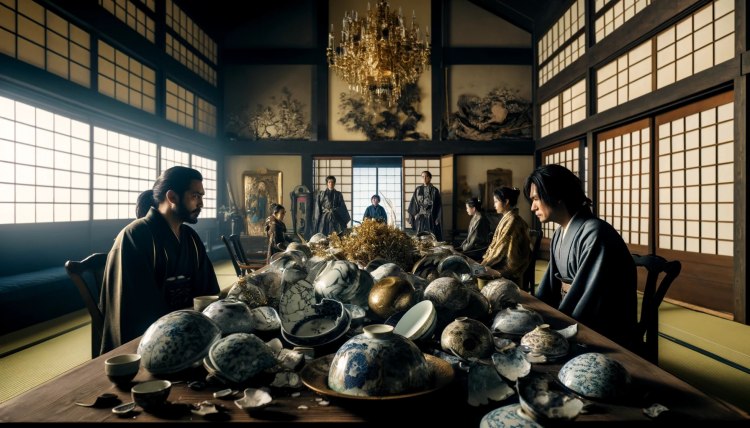The Daughter of a Samurai (Fairy Tale)
Step into the world of O Cho San, a graceful and dutiful daughter of a Samurai, whose life is a delicate balance between duty and danger. After her father's death, O Cho San works tirelessly to support her ill mother, mastering the art of genteel service
 Mary F. Nixon-Roulet
Mary F. Nixon-Roulet 
This image was created with the assistance of DALL·E
There was once a daughter of a Samurai who was both beautiful and good. Her name was O Cho San. Her father was dead, and she worked very hard to support her mother who was ill. The mother had trained her daughter in the best of manners, therefore O Cho San had no trouble in finding work.
There was a certain nobleman in need of a maid servant, and he approached O Cho San and asked her to serve him.
“What would my duties be?” inquired the girl as she respectfully bowed to the ground before him. “I must hear, and then I can tell if I can do them.”
“They are all the common duties of a maid,” he replied--“all but one thing, which is most strange. You will have the care of the porcelain plates of my fathers.”
“But that is not a strange duty for a maid,” answered O Cho San. She smiled at him, showing her pretty white teeth and a dimple in one cheek. “I have washed china before this, and always with care.”
“Yet it is the one thing which is most hard,--to find a maid who will attend to this,” he answered. “Know, O Cho San, that the porcelain is priceless. There are twelve plates and each one is perfect. They are so old that they are of the fashion of the Owari potter who learned the secrets of Karatsu and made a flight of cranes across the blue sky.
“The porcelain is so beyond all value that my ancestor made the law that whoever broke a plate should straightway have a finger cut off. So you see the china must be washed with care.”
O Cho San clasped and unclasped her slender brown fingers nervously, then she hid them quite away in the sleeves of her kimono. Her cheek paled a little, but she said bravely, “I will take the place, most honorable sir, and I shall try to keep my fingers.”
Then she thought to herself, “It is not the most desirable of places to live where one loses a finger for each nick of china, but the yen he pays are many more than I can earn elsewhere, and my dear mother must have tea and rice. Besides, it is not likely that such costly porcelain can be often used, and when it is, I shall offer many prayers that it be used in safety.”
So O Cho San served the nobleman faithfully.
It was easy to see that she was a favorite with all, for she had manners of such engaging gentleness that every one loved her. At first this pleased her. When, however, she found that even the master’s son was in love with her, she was unhappy.
She did not care at all for him, and she knew that to marry him would displease her master, who was kind to her. So she refused to listen to the young man, and this made him very angry. Being bad at heart, he resolved to be avenged upon her.
“I will ask my father to give a party at which the porcelain plates shall be used,” he said to himself. “She will surely break one, and then she will turn to me to save her from her punishment. If she does not, she will lose a finger;” and on his face there was a cruel frown.
As he had said, so it was done. The master gave a supper and the priceless dishes were used. Thanks to the kindness of the gods who watch over little maidens, O Cho San washed them, dried them on the softest of paper napkins, and set them carefully away all unbroken. But alas, when the master came to look them over, the bottom one of the pile was broken.
Great was the excitement.
O Cho San wept and proclaimed her innocence.
“Honorable Master,” she cried, “it is another hand than mine which has broken it. But if I am to be punished, cut a piece from my face instead of my hand. Then I may still work for my mother.”
“The law of my fathers required a finger for each plate broken,” said the master sorrowfully; for although he liked the gentle little maid and did not wish to hurt her, he feared to disobey the law.
“You shall not cut even her finger nail,” suddenly cried a rough voice. The group around O Cho San turned in astonishment to see who dared speak so to the master.
It was Genzaburo, a servant, very rough but honest and good.
“O Cho San may not be punished for what she has not done,” he said. “I myself broke the plate. You ask me why? Because I love O Cho San. She is as fair as the cherry bloom in early spring, but to me cold and remote as the snows upon the crest of the mountains. I thought to myself, she is a Samurai’s daughter and will never marry me. But if she lose a finger no one else will marry her. Therefore in time she will turn to me, and I shall win her for my wife. Then I broke the plate.”
“How did you break it?” demanded the master sternly.
“That I will show you,” said Genzaburo. “It was very simple. I was told to mend the lid of the box in which the plate was kept. Then I thought of the plates, and I drew forth one and bang! my hammer fell upon it just like this!” and he brought his hammer down with great force.
There was a crash terrible to hear, a scream from O Cho San, an exclamation of rage from the master, for the hammer had descended upon the pile of plates, and of the beautiful porcelain nothing at all remained but fragments.

In all the confusion Genzaburo alone was calm. He stood smiling at the ruin he had wrought, and his master cried, “The man is quite mad! Take him away!”
“Not so, my master, I am not mad,” Genzaburo replied. “I did this thing with reason. Take all my fingers if you wish, or even my life if the commands of your honorable ancestors must be carried out. But I shall have the happiness of knowing that no more little maids can be frightened and mutilated by your cruelty.”
The nobleman gazed upon him in silence; but the son threw himself before his father.
“I beg you, oh my father, forgive this mad fellow,” he cried. “I too am in fault, for I persuaded you to give this entertainment in the hope that she would break a plate and then turn to me in her trouble.”
Then O Cho San knelt before him and said, “Honorable Master, since I am the occasion of this great trouble in your household, I beg you to permit me to go away and be not angry with either your son or your servant. Forgive them, and of your graciousness allow me to depart, since my only wish is to work for the welfare of my dear mother.”
Then was the nobleman greatly touched. Mindful of Genzaburo’s long service, he forgave him. He forgave his son, also; for since O Cho San loved him not, he needed no further punishment. Mindful still more of O Cho San’s pleasant services in his household, he said, “We will speak no more of the porcelain plates of my ancestors. O Cho San will not leave me. She shall continue to live in my service and her wages shall be increased.”
Then he gave her a reward, and she lived many years and earned much yen for the welfare of her dear mother.
This story is part of "Japanese Folk Stories and Fairy Tales" by Mary F. Nixon-Roulet. Read all the stories from this enchanting collection HERE!
✍✍✍
The story you've just experienced is a work of fiction, a creation of the imagination meant to entertain, provoke thought, and inspire. From the heart-fluttering highs of love stories to the spine-tingling chills of horror, these stories are unbound by the mundane. Whether you're in the mood for a quick escape or a deep dive into fantastical realms, explore the place where imagination echoes beyond the ordinary - Echoes of Imagination!
More fictional stories from from Echoes of Imagination 👇
The Boy and the Spirits of Things (Fairy Tale)
The Waterfall Which Flowed Saké (Fairy Tale)
The Coming of Benten Sama (Fairy Tale)
The Painter of Cats (Fairy Tale)
The Mountain Rose (Fairy Tale)
Beneath the Willow's Sigh: A Love Story Forged in Sacrifice (Fantasy Story)
Between Dreams and Shadows: Lyra's Last Whisper (Fantasy Story)
Whispers in the Walls: The Curse of Thornwood Mansion (Horror Story)
The Fabric of Us: The Unseen Threads of a Mother-Daughter Bond (Family Story)
Blossoms of Connection: A Tale of Rosewood Love (Love Story)
Canvas Souls: The Painter's Secret (Horror Story)












